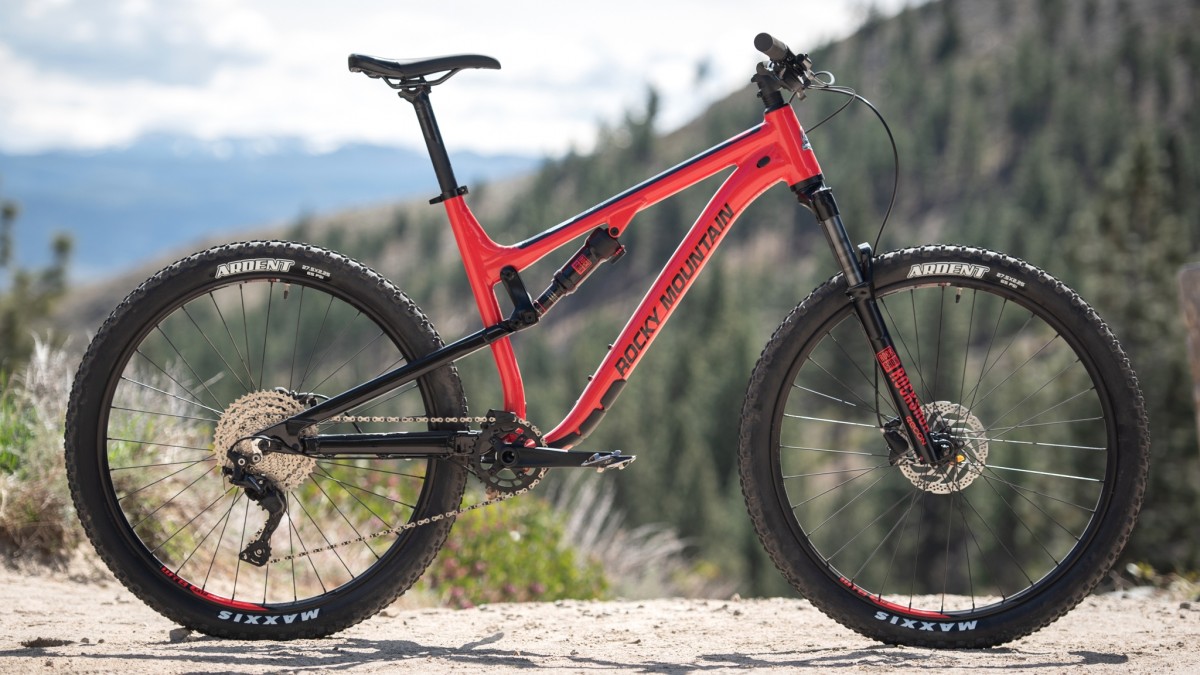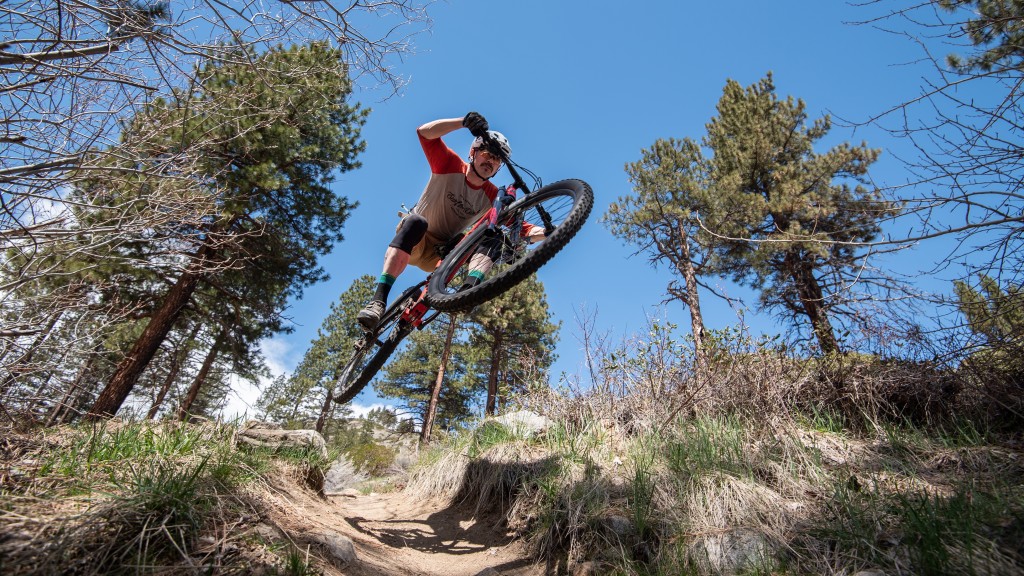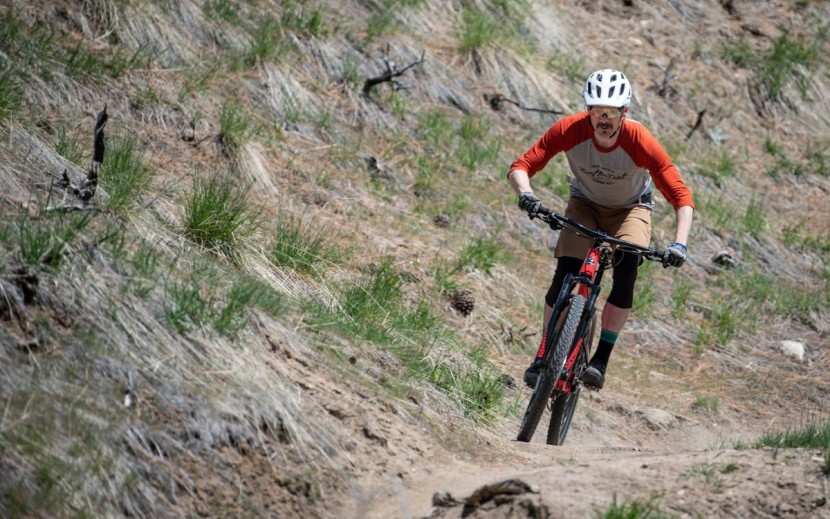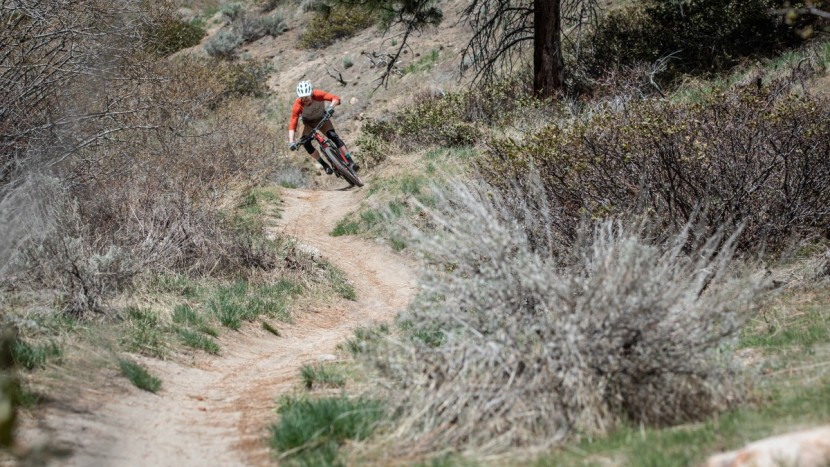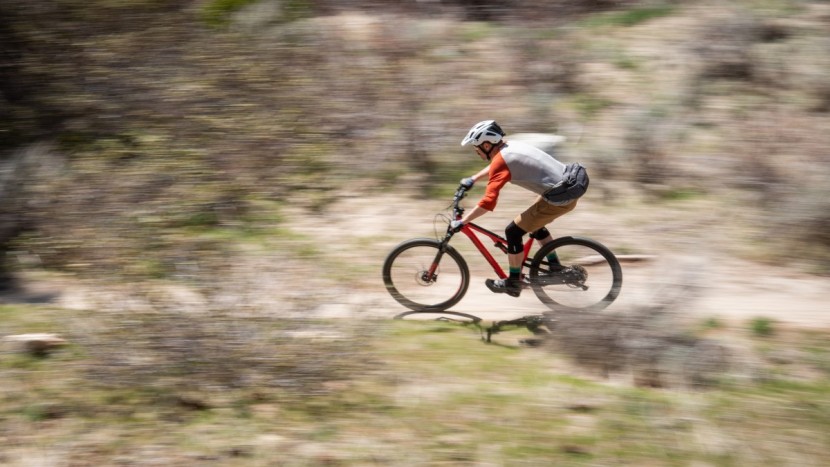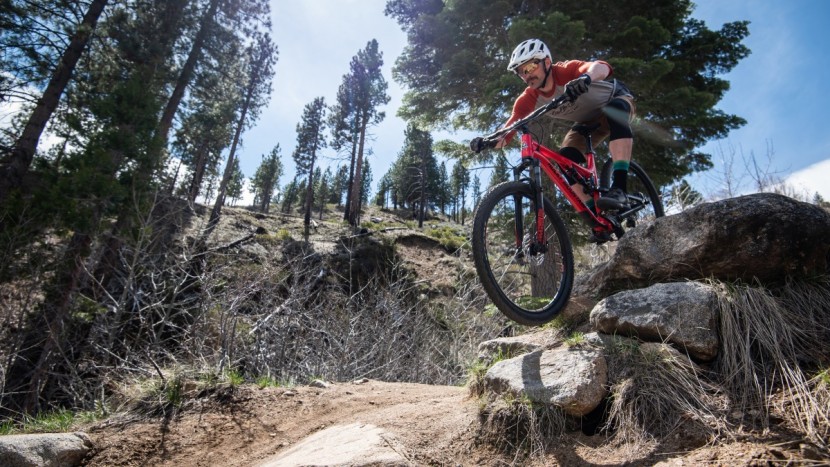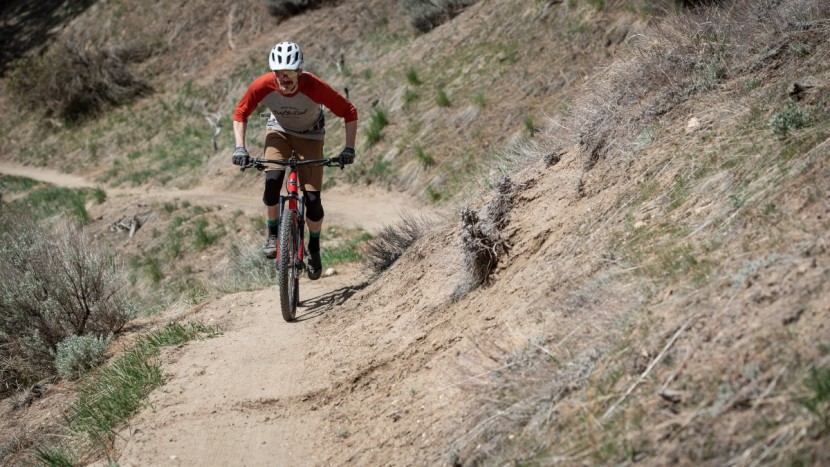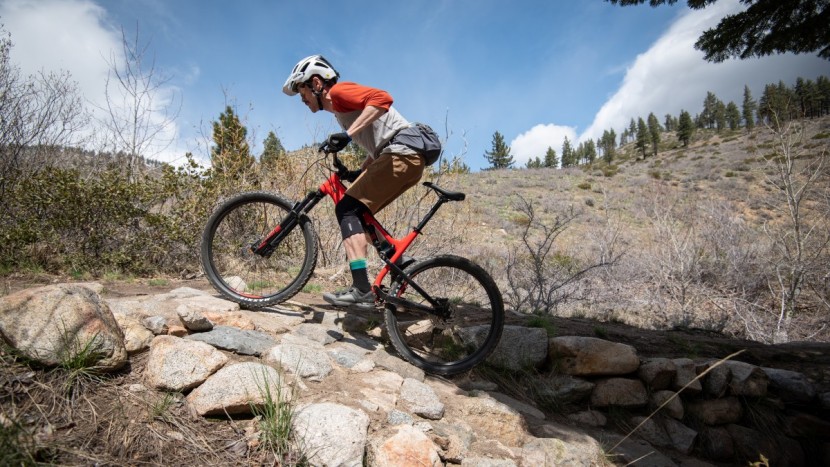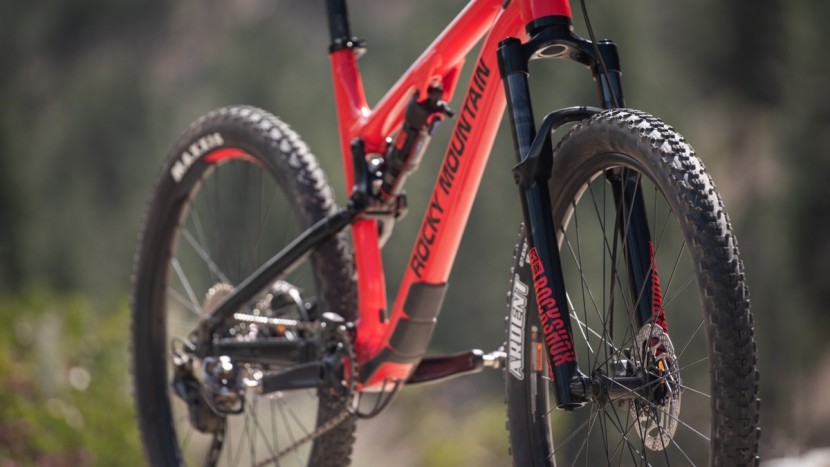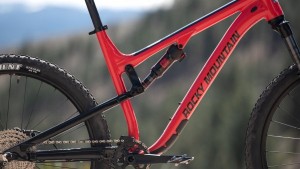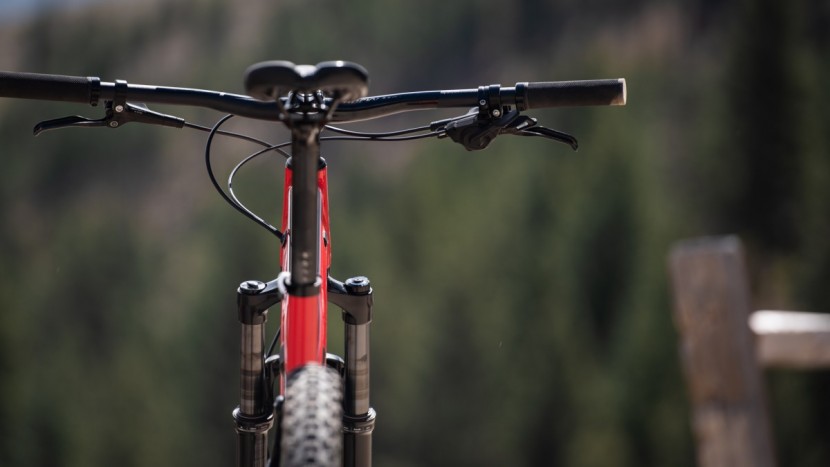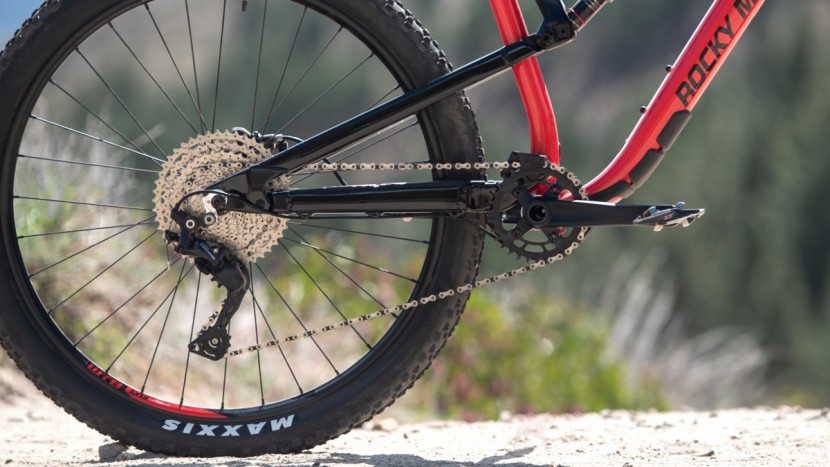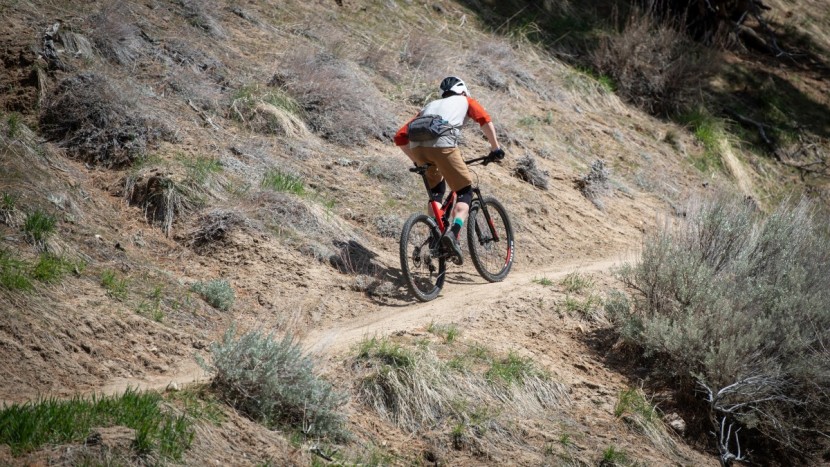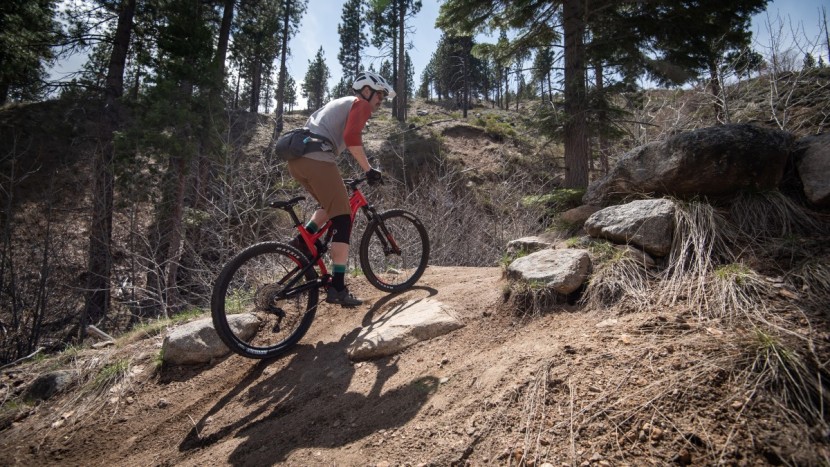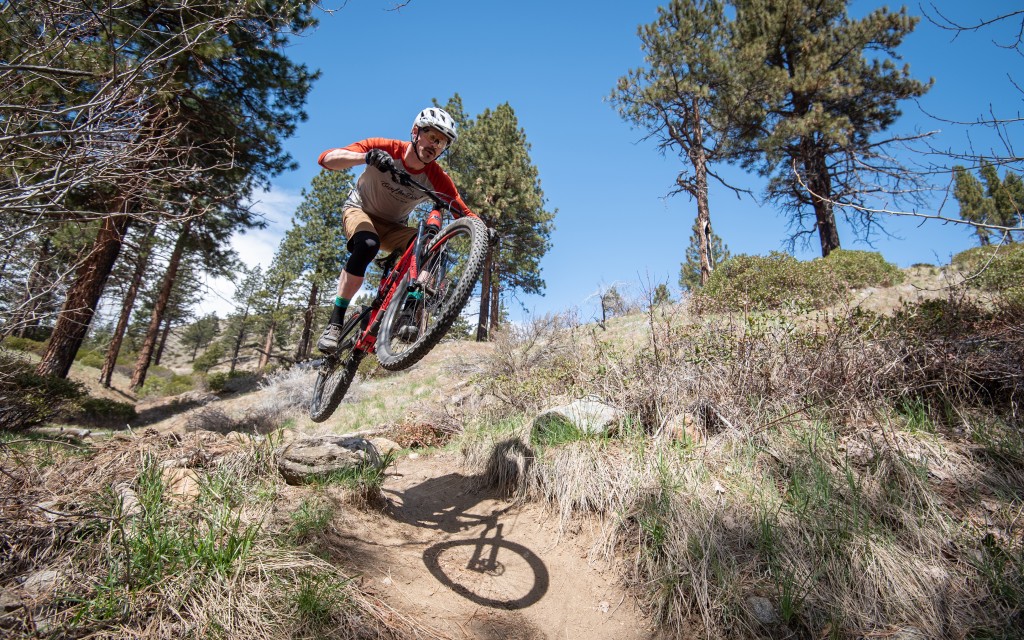Rocky Mountain Thunderbolt Alloy 10 Review
Our Verdict
Our Analysis and Test Results
Should I Buy this Bike?
When we saw a Rocky Mountain Thunderbolt that retailed for right around $2000 we thought that it could potentially give some of the other bikes in this review a run for their money. The frame design and geometry look agreeable and it seems like it could be an awesome budget friendly mid-travel trail bike. Unfortunately, due to the very unimpressive component specification that comes attached to this version of the Thunderbolt this bike is seriously under-gunned and is the least trail worthy model in this review. Sure, you can ride this bike on singletrack trails, but our testers found that it didn't inspire much confidence and it was best suited for smooth and mellow trails and low to moderate speeds. If you aren't an aggressive rider and you're looking for a full suspension mountain bike that you'll only ride occasionally then this may be a good option for you. If you want to ride aggressively at all we suggest looking elsewhere.
Fun Factor
Riding bikes is inherently fun and you can certainly have a good time riding the Thunderbolt Alloy 10 as long as you stay within its limits. This bike has both a speed and trail difficulty limit due to its super-budget components. Assuming riding smooth trails at low to moderate speeds is what you're into then you might have a blast on this bike. If you prefer to let it rip and maybe you want to blast through a chunky rock garden every once in a while then you'll find this bike's limitations quickly which may result in having a bad time.
Again, the limits of this bike are a result of its components. The overall frame design and geometry are capable of handling much more than the parts attached to it can. The narrow and flexy wheels with skinny tires dramatically hold this bike back, as does the flimsy fork and lack of a dropper seat post. Testers had little confidence in this model, and being nervous about the bike you're riding isn't exactly our definition of fun.
Downhill Performance
Despite the many low-grade components on the Thunderbolt Alloy 10 we could tell that this bike could be a blast to ride downhill. In fact, our testers did have a little fun descending on this bike on some smoother and mellower trails and at moderate speeds. It handles relatively well, with a lightweight and nimble feel and a highly adjustable geometry that hits the modern trail bike sweet spot. Rocky Mountain's adjustable geometry system is known as Ride 9 and allows the user to choose between 9 different geometry positions from slack to steep that change the head and seat tube angles by about a full degree. We tested it primarily in the neutral position which we found to be a good middle ground with a measured head tube angle of 66.9 degrees and a seat tube angle of 74.7 degrees.
Outside of smooth and mellow trails, the limits of the Thunderbolt were quickly and easily reached. We hate to sound like a broken record, but again the components on this bike are its main limiting factor on descents. The non-boost RockShox Recon Silver fork has 120 mm of travel, but it's flexy, hard to tune, and generally feels like a pogo stick in compression and extension. The rear shock felt surprisingly smooth and plush in comparison, a testament to Rocky Mountain's Smoothlink suspension design. The lack of a dropper seat post is also disappointing when you descend on this bike, as you need to stop to raise and lower the saddle by hand. Other bikes in this price range come with much better forks and dropper seatposts.
The wheels and tires on the Thunderbolt look and feel like something you'd find on a bike from two decades ago. It's spec'd with WTB SX19 rims with a 19mm internal rim width that aren't tubeless compatible and are attached to the bike with old-school quick release skewers. These wheels are flexy and felt like they might fold underneath you if you cornered too hard or landed wrong off a small rock drop. Modern bikes typically use thru-axles both front and rear, as well as wider rims that work better with modern width tires. The 2.25" Maxxis Ardent tires are narrow and don't provide much traction with their low profile tread design, plus they can't be setup tubeless. We flatted the front tire almost instantly.
Uphill Performance
In contrast to the Thunderbolt Alloy 10's mediocre downhill performance, testers found it to perform relatively well on the climbs. It rolls fast and has a nice middle of the road geometry that provides a comfortable seated pedaling position and responsive handling. The suspension is relatively supportive and provides good climbing traction on trails, plus the rear shock has a lockout switch that is useful for extended periods of dirt road or paved climbing.
The same skinny tires that don't provide confident cornering traction on the descents help to give this bike very little rolling resistance. They don't offer the best traction on steep and loose sections of climbing but they zip up smooth and firm trail surfaces with ease. The Shimano Deore 10-speed drivetrain shifts well and provides ample range for all but the steepest of climbs.
The bike's geometry also plays a role in how it handles, with a moderate length wheelbase, short chainstays, and a 66.9-degree head tube angle that help to keep you on line and handle sharp uphill switchbacks with ease and confidence. The moderately steep 74.7-degree seat tube angle puts the rider nicely above the bottom bracket for solid power transfer while the moderate length 466mm reach doesn't make you feel cramped or too stretched out.
Build
The build of the Thunderbolt Allot 10 that we tested is easily the least impressive of all the models in this test and the primary reason that this bike performed so poorly compared to the competition. This is the base model in their Thunderbolt lineup and it's obvious to us that the Thunderbolt could be an amazing trail bike, but in this case, it is held back by a barely trail worthy component specification. This bike has potential, but to unlock it you're going to want to check out the more expensive versions.
The Alloy 10 has 120mm of front wheel and 130mm of rear wheel travel. Rocky Mountain has spec'd a RockShox Recon Silver 120mm fork with non-boost spacing up front. This fork is somewhat flimsy and you can feel it flex, plus it has a somewhat sticky and pogo stick-like feel to it. We also question the use of a non-boost spacing fork and the fact that the wheel is attached with an old school quick release skewer. It does not inspire any confidence. The RockShox Deluxe RT rear shock is nothing special, but it works well and gives this bike a plush feeling rear end.
The wheels and tires on the Thunderbolt are another low point of this build. As mentioned above, both wheels are secured by quick release skewers that we're no longer used to seeing on bikes intended for real mountain biking. They also spec'd very narrow, by today's standards, WTB SX19 rims that can't be set up tubeless. To those rims they mounted Maxxis Ardent 2.25" tires both front and back that provide very little climbing or cornering traction. This wheel and tire combo is not made for serious trail riding, although they can handle light duty use on smooth trails just fine and roll quite fast in the right conditions.
The cockpit setup is one of this bike's high points, up front anyway. The 760mm wide handlebar is a reasonable width and it's paired with a short stem and comfortable lock-on grips. They did a fine job choosing the comfortable WTB Volt saddle, but sadly it's mounted to a rigid seat post. We've become accustomed to dropper seat posts, even on bikes in this price range, and it's disappointing to ride a bike without one. At least they put a quick release seat post clamp on there, so adjusting your saddle height is a little easier than it could be otherwise.
The Shimano M315 brakes work okay but they are certainly a little underwhelming. They can handle the lower speed limit of this bike, but they are far from powerful. The Shimano Deore 10-speed drivetrain is nothing to write home about either, but we can't complain about its crisp and precise shifting performance. Sure we prefer 11 and 12-speed drivetrains, but the Deore 10 speed works well enough.
Best Applications
The Thunderbolt Alloy 10 is best suited to the light-duty mountain biker who does not push the limits. If you're looking for an all-around bike that you'll occasionally use to go mountain biking on some smooth trails at a mellow pace, this could be a good option for you. If you have aspirations of getting after it in any way on your bike then you should look elsewhere in this price range.
Value
At $1,999 we have a really hard time calling the Thunderbolt Alloy 10 a good value. This is the least trail worthy bike in this test, due to its poor component specification, and we would recommend several other models before this, some of which cost less. If you're on a serious budget and you want a bike that can rip we suggest out Best Buy Award winner, the Giant Trance 3, which costs the same as the Thunderbolt.
Conclusion
The Thunderbolt Alloy 10 is an affordable mid-travel mountain bike that clearly has potential but is held back from greatness by a poor component specification. If you're a very easy going mountain biker who rides occasionally on smoother trails at low to moderate speeds then this may be a good option. If you have aspirations of riding aggressively at all then we'd point you to one of the many more trail worthy bikes in this review or a more expensive build of the Thunderbolt.
Other Versions
The Thunderbolt Alloy 10 we tested is the base model in Rocky Mountain's range of Thunderbolt bikes. It is available in sizes XS-XL.
- The Thunderbolt Alloy 30, $2,649, comes with a beefier Rock Shox Sektor fork, Shimano SLX drivetrain, Shimano MT500 brakes, and 2.3" Maxxis Minion DHR II tires.
- The Thunderbolt Alloy 50, $3349, is their top of the line alloy-framed model. It comes equipped with a quality Fox Float Performance 34 fork, Fox Float DPS EVOL rear shock, Shimano SLX/XT drivetrain, wider rims and beefy 2.3" Maxxis Minion DHR II tires, and a Race Face Aeffect dropper seat post.
- The Thunderbolt Carbon 50, $4,599, is the base carbon model that comes equipped with Fox Float Performance suspension, Shimano SLX brakes, a SRAM GX Eagle drivetrain, Maxxis Minion DHR II tires, and a Fox transfer Performance dropper post.
- The Thunderbolt Carbon 70, $5,399, comes clad with Fox Float Performance Elite suspension, Shimano XT brakes, a SRAM GX Eagle drivetrain, Race Face ARC 25 wheels, Maxxis Minion DHR II rubber, and a Fox Transfer dropper seat post.
- They also offer the Thunderbolt Carbon 90 BC Edition, $5,999, that has 140mm of front and rear wheel travel, beefy Fox 36 Float fork, Shimano XT brakes with Ice-Tec rotors, SRAM GX Eagle drivetrain, Race Face ARC 27 wheels, and a Race Face Turbine R dropper post.


